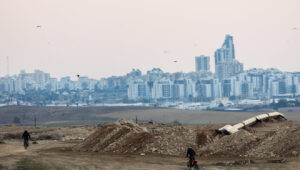This article was originally published on August 8, 2021, but has again become very relevant in light of the current conflict over the Negev.
The Negev Desert was at the center of David Ben-Gurion’s vision for Israel’s modern rebirth, to the extent that he set a personal example by living in a tiny village in the heart of the wasteland until his death.
Decades later, Israel’s government now stands accused of turning its back on the south of effectively losing control of the Negev.
State Comptroller Matanyahu Englman on Wednesday submitted to the Knesset a scathing report over the dire economic, infrastructure and security situation focused on the large Bedouin population living in the vast biblical wilderness.
“The Bedouin population in the Negev is the poorest in Israel and suffers from a lack of infrastructure and quality education. It has a high rate of tax evasion, polygamy, bribery and vandalism and theft targeting both civilian and military property,” wrote Englman.
He insisted that “the Israeli government is responsible for increasing governance in the Negev.” But already for years complaints over a lack of policing that has led to a kind of “Wild West” in Bedouin-dominated areas have fallen on deaf ears.
Israel Today reported and spoke to locals in the Negev earlier this the year regarding the lawlessness. In particular, we exposed how some Bedouin criminal gangs have built massive marijuana growing facilities in the heart of Israeli army training grounds.
Englman warned that there’s an even more serious problem. The Negev is home to some very sensitive IDF intelligence facilities that the Bedouin regularly infiltrate. The stolen equipment and vandalism is one thing, but there’s concern that they could also be gathering information for Israel’s enemies.
Visit the Negev!
In a related but seemingly contrary bit of news, Time Magazine has named the Negev Desert one of its top 100 places in the world to visit in 2021.
The venerable publication raves about “the bohemian, Bedouin-influenced city of Be’er Sheva, a peak rumored to be the real Mount Sinai, and amber canyons and concealed valleys that make for amazing hikes.”
About that candidate for the biblical Mount Sinai, Time is referring to Mount Karkom, an isolated hill on the southwestern edge of the Negev that some archaeologists say contains compelling evidence that it is the site where Moses received the 10 Commandments.
The magazine also talks about Israel’s heroic agricultural efforts in the Negev, efforts that have literally caused the desert to bloom, in accordance with biblical prophecy. The editors were particularly impressed by Israel’s reviving of ancient Nabetaean wine regions.
As our readers are no doubt aware, Israel Today is heavily involved in this effort with our vineyards in the area of the biblical Kadesh Barnea.















